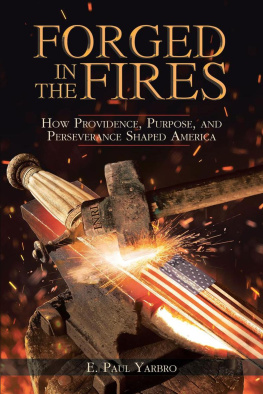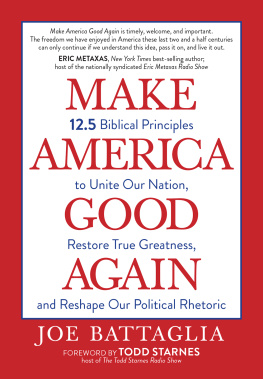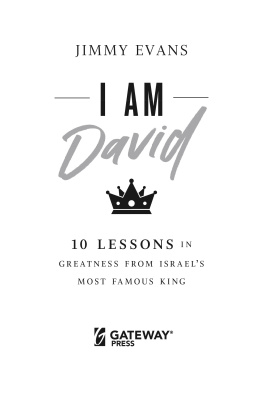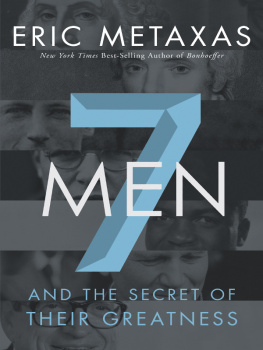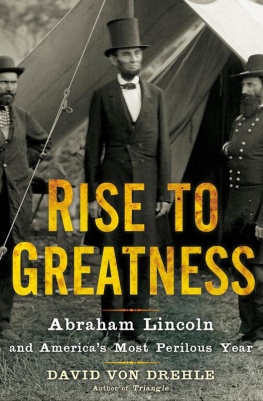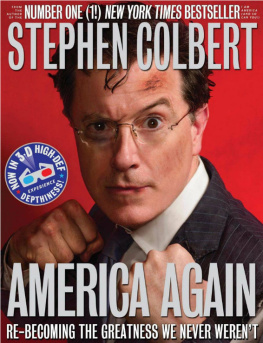Forged in the Fires
How Providence, Purpose, and Perseverance Shaped America
E. Paul Yarbro
Copyright 2020 by E. Paul Yarbro
All rights reserved. No part of this publication may be reproduced, distributed, or transmitted in any form or by any means, including photocopying, recording, or other electronic or mechanical methods without the prior written permission of the publisher. For permission requests, solicit the publisher via the address below.
Christian Faith Publishing, Inc.
832 Park Avenue
Meadville, PA 16335
www.christianfaithpublishing.com
Printed in the United States of America
Table of Contents
To Jennifer, Jake, James, and Eric who believed in this bookand its author.
Introduction
American history is more than dates or events to be memorized. It is voices from the past calling to our own time, asking us to listen.
American history is the experience of a nation through the actions of its people. A nation is much like an individual with its failures, tragedies, and triumphs adding to its experience. Both make mistakes and can learn from them. Both individuals and nations are shaped by their past and often determine their future in how they perceive it.
Americans share a unique history. It is the story of a people who believed in Christian providence (Gods intervening hand in the lives of people and events), the certainty of a greater purpose in a divine plan, and the gritty self-reliance and perseverance to overcome anything. Their stories are the real history of America, not the events themselves.
They were forged in the fires of adversity and relied on Christian faith to rise above the flames. With the impurities burned away, their character became the sword they carried into history.
They are calling from the past.
It is up to us to listen.
This is their story
He shall baptize you with the Holy Ghost,
and with fire.
John the Baptist,
Matthew 3:11
Behold, I have refined thee, but not with silver; I have chosen
thee in the furnace of affliction.
Isaiah 48:10
God will not have his work made manifest by cowards.
Ralph Waldo Emerson
Self-Reliance
People and nations are forged in the
fires of adversity.
John Adams
The Warrior and the Saint
Jamestown, Virginia, 1609
The short stout man hurried through the forest, shoulders back and head held high. His head was up because he felt alive again.
They had to get back to the colony fast. He needed to explain something to all of them. Coming off one successful outing made him eager to try another.
At five-foot-four, he was two inches shorter than the average Englishman but appeared taller. Sharp-eyed and muscular, he had a full auburn beard, a high forehead, and a Roman nose, but something about his eyes made others uneasy. Why they felt threatened, no one could quite put a finger on, but it was there just the same. He was used to their prejudice and saw much in his twenty-nine years, and though the son of a farmer, he was much more than that.
Captain John Smith restrained his ambition too long and would no longer deny the truth. He had trusted himself and had been victorious once again, and it tasted sweet. Throughout his life, he proved to himself who he was, but for some reason, he felt the need to convince everyone else. Why did others have to validate what he knew to be true? Wasnt it enough that he knew it himself? The gentlemen and their self-righteous claims that birth determined a mans path planted seeds of doubt in the unconscious mind and caused men to question their abilities; though he knew it was a lie, it still controlled society. How many good men would never know their true potential because of this ignorance?
The lives of every man in Jamestown depended on his actions today, and he was ready to shatter the lie. This was why he needed to get there as quickly as possible. He would conquer the darkness of deception with the light of truth. To conquer is to live . Remembering this motto and the shield it adorned reminded him why. The men of Jamestown didnt know him, but they were about to understand him. With every step, the smile widened as his heart pounded in his chest. They would know who he was soon and be better for it. He had shown the Indians, and now, he would show them as well.
Fifteen other men attempted to keep up with him but to no avail. They were burdened with the baskets of Indian corn, beans, and other staples secured by his gamble. Because of this, they remained vigilant and were startled by every shadow or crack of a branch.
No one could believe what they had witnessed the day before. He was either the bravest or craziest man alive, and they beamed with pride as he urged them to hurry. Some at the settlement said he was arrogant, but his words and actions told these men a different story. His countenance was not arrogance, but confidence in purpose. He wasnt all talk like the others. He had proven his mettle to them.
Turning around, he encouraged them to make haste. The settlement was just past the next rise. He saw their smiles before he resumed his march, and it energized him. They respected courage and leadership, even coming from one of their own. He could depend on them once inside and would need their help enforcing order. Those at the settlement would need a firmer hand to convince. For close to two years, he had tried to tell them they were on the road to destruction, but they scoffed at his warnings.
Who do you think you are? they asked. What vanity it was to believe in his own relevance? The gentlemen were their masters. At least, this was what they were told. Gods divine plan determined status, not an individuals merit. Gentlemen were born to lead men and nations. All he was qualified to lead were pigs, chickens, and plow horses, they said. How he managed to worm his way onto the council was a mystery. The farmers son didnt know his place in the English class system. Many reminded him of his lowly birth but failed to convince him of it. They had no idea what hed been through or all hed accomplished.
Approaching the stockade, Captain John Smith wiped the perspiration from his forehead with a sleeve and managed another small grin. Calling to the guard, he ordered the gate opened.
Entering the settlement of Jamestown after any period away was like experiencing it for the first time again. Crude shelters of tree branches and decayed cloth lay scattered throughout the camp while the putrid smell of filth, sickness, and human waste invaded the nostrils. Quiet whimpers of pain mingled with hacking coughs rounded out this symphony of despair. The inhabitants didnt seem to care anymore, and hopelessness spread quicker than disease. Some envied the dead and waited to join them while others slept under the shelters. A few sat staring at nothing, lost in memories of better times, but mostly, their minds were as barren as their stomachs; they would rather starve and rot with idleness, than be persuaded to do anything for their own relief.
Johns grin turned into a grimace. No longer could he sit by and watch as they destroyed themselves and the colony. The English class system produced in the New World what it did in the olddependency and entitlement.
The settlers would receive minor relief from the baskets of food the expedition carried inside. The common store was rat-infested and moldy from carelessness. The daily ration was reduced to a cup of boiled barley and a cup of worm-infested wheat. The worms werent so bad; they supplied a bit of the much-needed protein absent from their diets, so no one complained. The water was worse. Parasitic and brackish, it caused dysentery and salt poisoning. It tasted terrible, yet nobody cared to dig a well. The ground they chose to settle in was surrounded by swamps teeming with mosquitoes, and though an excellent strategic position, it wasnt conducive to health in the seventeenth century. Malnutrition from insufficient diets weakened their immune systems while the typhoid, malaria, and diarrhea weakened their numbers.

